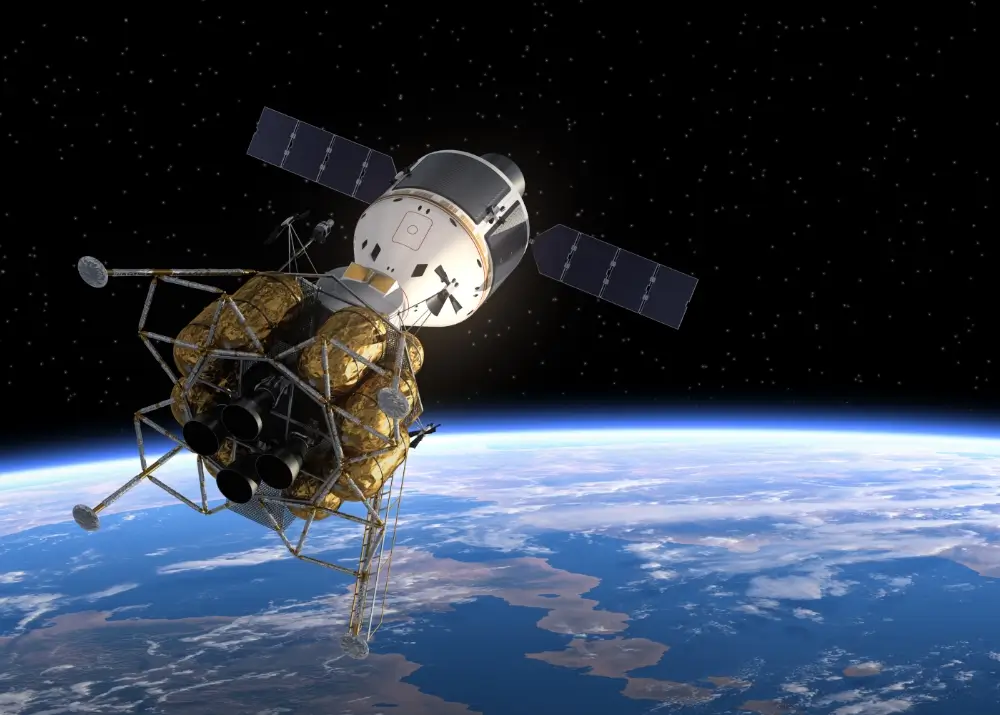“The Road to Making Humanity Multiplanetary,” that’s the mission statement of SpaceX, one of the biggest privately-owned space Economy tech companies in the world. The idea behind this mission is to establish a self-sustaining human colony on Mars, which will serve as a backup for earth and expand the horizons of human civilization.
Sounds ambitious, doesn’t it? One would even say it’s a far-fetched dream at best. But by the speed at which we’re advancing in space technology, living on Mars might very much be our reality in the near future.
We’re living in very exciting times right now, where it’s quite literally possible for a regular human being to take a trip to space. Space technology that was once only restricted to government domains has been stretching its reach since the last couple of years. Technological advancements and the reduced costs of space missions are the two major factors in space tech being a welcoming industry to new players in the game.
According to Grand View Research’s Market Analysis Report on Space Technology, the global industry of SpaceTech which was valued at USD 420.2 billion in 2022, is now expected to grow at a CAGR of 7.5% from 2023 to 2030. These numbers show the sheer scope of growth for the industry in the coming years.
But there’s more. Apart from the fact that the space tech industry has propelled a major influx of funds in the global economy, it is also changing the way we live our lives. In the following article, we will uncover precisely how the space economy is changing the world!
Job Prospects in Evolving Space Industries
The space economy has the potential to generate a significant number of jobs across various sectors. In a report on economic impact unveiled by NASA in October 2022, it was calculated that the U.S. space agency contributes to the employment of approximately 340,000 individuals across the nation, with these positions offering salaries that exceed the national average. This includes engineers, scientists, technicians, astronauts, project managers, and support staff. With the growth of space-related industries such as satellite technology, space tourism, and asteroid mining, there will be an increasing demand for skilled professionals and hence, increased job creation.
Investing in Space Exploration: High Risks, High Rewards
The space economy offers unique investment opportunities. Private companies and investors are increasingly entering the space industry to fund startups, research, and infrastructure development. These investments can yield substantial returns as the industry matures and generates revenue. Morgan Stanley projects that by 2040, the worldwide space sector has the potential to generate over $1 trillion in revenue, a significant increase from its current $350 billion valuation.
Also, according to Morgan Stanley’s projections, satellite broadband is expected to account for 50% of the anticipated expansion in the global space economy by 2040, and in the most optimistic scenario, it could contribute as much as 70% to this growth. The deployment of broadband Internet services via satellites is poised to reduce data costs while witnessing a surge in demand for data.
Space exploration has the potential for high returns on investment, especially in areas like space tourism, resource mining, and satellite services. Investors who support innovative space ventures could see substantial financial gains as these markets expand. It is projected that in 2027 the U.S. government will spend 12.8 billion U.S. dollars on space exploration.
Space Economy’s Growth Spurred by Government Backing
Governments are playing a crucial role in nurturing the space economy through funding, regulation, and incentives. They often invest in space research and infrastructure, providing a foundation for private companies to build upon. For example, NASA’s support for commercial spaceflight has paved the way for private companies like SpaceX and Blue Origin to thrive. The global government expenditure on space programs has gone up from $42.4 billion in 2014 to $103 billion in 2022. This is the testament to the government’s interest in future space technologies, programs and initiatives.
Utilizing Space Resources for Sustainability on Earth
Space is a vast source of resources, including water on the Moon and asteroids, which can be utilized to support sustainability on Earth. Water can be converted into rocket propellant or used for life support in future space missions. In-situ resource utilization (ISRU) technologies can reduce the need to transport resources from Earth, saving costs and reducing the environmental impact of space exploration. As Earth faces resource scarcity and environmental challenges, the ability to extract and utilize space resources can play a crucial role in addressing these issues. It can reduce our reliance on Earth’s finite resources and help support sustainable development.
The Space Race and Competition Among Nations
The space race has historically been a significant driver of innovation in space technology. During the Cold War, the United States and the Soviet Union competed fiercely in space exploration, leading to rapid advancements in technology from space exploration. Today, multiple nations, including the United States, China, Russia, and others, are engaged in a new space race. They compete for dominance in space technology used in space and aim to establish strategic positions in space research and technology.
The Importance of Space in National Security
Space technology plays a critical role in modern national security. Satellites are used for communication, reconnaissance, and navigation, making them vital assets for defense. Lockheed Martin Space Engineering and Technology is a prominent player in the development of technology in space, contributing to national security efforts. Artificial intelligence is increasingly integrated into space technology, enhancing the capabilities of spacecraft and satellites. It improves autonomous decision-making and data analysis.
Collaborative Efforts in International Space Exploration
While competition exists, international collaboration is also a key aspect of space research and technology. Organizations like NASA collaborate with space agencies from various countries on missions such as the International Space Station (ISS). These collaborative efforts promote innovation in space technology and advance our understanding of science, space, and technology. Open space technology is a collaborative approach that encourages innovation and problem-solving in space research and technology. It fosters creativity and allows diverse stakeholders to contribute to the development of new space technologies.
How Does Technology Limit the Future of Space Exploration
Although technology has enabled remarkable achievements in space exploration, it also presents limitations. Challenges like radiation exposure during long-duration space travel and the need for more efficient propulsion systems must be addressed. Additive space technologies, which include 3D printing, offer potential solutions by enabling on-demand manufacturing of parts in space, reducing the need for extensive Earth-based supply chains.
Overcoming technological limitations is crucial for the future of space exploration. Innovative solutions, such as blue space technology (referring to advanced underwater systems used for space exploration simulation), can help prepare astronauts for missions to the Moon, Mars, and beyond.
Contributions to Our Understanding of the Universe
Space exploration has been pivotal in expanding our knowledge of the universe. Advanced technology from space exploration, including powerful telescopes and space probes, has allowed scientists to observe distant celestial bodies and phenomena. These observations have led to groundbreaking discoveries, such as the understanding of black holes, exoplanets, and the age of the universe.
Potential for Extraterrestrial Life Discovery
Technology used in space exploration has opened up exciting possibilities for the search for extraterrestrial life. Missions to Mars and the moons of Jupiter and Saturn have revealed evidence of conditions that could support life. The future space technology, including advanced rovers and sample-return missions, aims to further investigate the potential existence of microbial life or signs of past life beyond Earth. New space technologies, such as miniaturized instruments and improved life-detection techniques, are critical in our quest to answer the fundamental question of whether life exists elsewhere in the universe.
Summing Up
The burgeoning space economy offers opportunities as vast as the cosmos itself, with the promise of high-paying jobs, groundbreaking discoveries, and sustainable solutions to global challenges. As we watch the space economy evolve, we are reminded that our world is but a pale blue dot in the cosmic sea. It is incumbent upon us to protect and preserve our home planet while exploring the cosmos, nurturing innovation, and inspiring generations yet unborn.

 Trishika Rokade, Writer and Content Strategist
Trishika Rokade, Writer and Content Strategist










